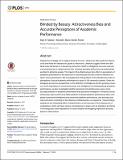Files in this item
Blinded by beauty: attractiveness bias and accurate perceptions of academic performance
Item metadata
| dc.contributor.author | Talamas, Sean | |
| dc.contributor.author | Mavor, Kenneth Ian | |
| dc.contributor.author | Perrett, David Ian | |
| dc.date.accessioned | 2016-03-04T16:10:03Z | |
| dc.date.available | 2016-03-04T16:10:03Z | |
| dc.date.issued | 2016-02-17 | |
| dc.identifier | 240790110 | |
| dc.identifier | 51390475-8970-4f34-8b8d-e9bd9c135763 | |
| dc.identifier | 84960449507 | |
| dc.identifier | 000371218400028 | |
| dc.identifier.citation | Talamas , S , Mavor , K I & Perrett , D I 2016 , ' Blinded by beauty: attractiveness bias and accurate perceptions of academic performance ' , PLoS One , vol. 11 , no. 2 , e0148284 . https://doi.org/10.1371/journal.pone.0148284 | en |
| dc.identifier.issn | 1932-6203 | |
| dc.identifier.other | ORCID: /0000-0002-3160-3889/work/60427970 | |
| dc.identifier.other | ORCID: /0000-0002-6025-0939/work/64360936 | |
| dc.identifier.uri | https://hdl.handle.net/10023/8363 | |
| dc.description.abstract | Despite the old adage not to ‘judge a book by its cover’, facial cues often guide first impressions and these first impressions guide our decisions. Literature suggests there are valid facial cues that assist us in assessing someone’s health or intelligence, but such cues are overshadowed by an ‘attractiveness halo’ whereby desirable attributions are preferentially ascribed to attractive people. The impact of the attractiveness halo effect on perceptions of academic performance in the classroom is concerning as this has shown to influence students’ future performance. We investigated the limiting effects of the attractiveness halo on perceptions of actual academic performance in faces of 100 university students. Given the ambiguity and various perspectives on the definition of intelligence and the growing consensus on the importance of conscientiousness over intelligence in predicting actual academic performance, we also investigated whether perceived conscientiousness was a more accurate predictor of academic performance than perceived intelligence. Perceived conscientiousness was found to be a better predictor of actual academic performance when compared to perceived intelligence and perceived academic performance, and accuracy was improved when controlling for the influence of attractiveness on judgments. These findings emphasize the misleading effect of attractiveness on the accuracy of first impressions of competence, which can have serious consequences in areas such as education and hiring. The findings also have implications for future research investigating impression accuracy based on facial stimuli. | |
| dc.format.extent | 1288868 | |
| dc.language.iso | eng | |
| dc.relation.ispartof | PLoS One | en |
| dc.subject | BF Psychology | en |
| dc.subject | DAS | en |
| dc.subject.lcc | BF | en |
| dc.title | Blinded by beauty: attractiveness bias and accurate perceptions of academic performance | en |
| dc.type | Journal article | en |
| dc.contributor.institution | University of St Andrews. School of Psychology and Neuroscience | en |
| dc.contributor.institution | University of St Andrews. Centre for Higher Education Research | en |
| dc.contributor.institution | University of St Andrews. Institute of Behavioural and Neural Sciences | en |
| dc.contributor.institution | University of St Andrews. Centre for Social Learning & Cognitive Evolution | en |
| dc.identifier.doi | 10.1371/journal.pone.0148284 | |
| dc.description.status | Peer reviewed | en |
This item appears in the following Collection(s)
Items in the St Andrews Research Repository are protected by copyright, with all rights reserved, unless otherwise indicated.

